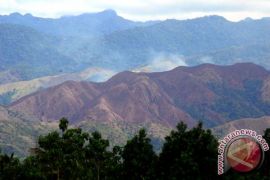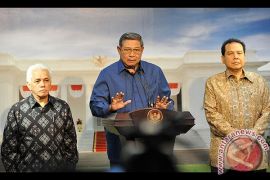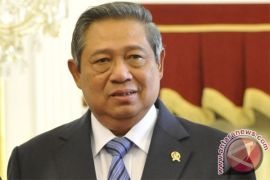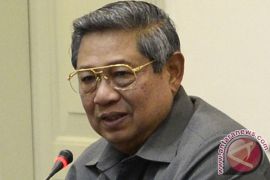The news on the two-year moratorium decree was revealed to the press by Agus Purnomo , a presidential aide for climate change affairs, here Thursday (May 19).
According to Agus, the deforestation moratorium decree was a combination and simplification of two drafts proposed respectively by the forestry ministry and the presidential REDD+ (Reducing Emission from Deforestation and Forest Degradation) Task Force.
Environmental NGOs had urged the immediate implementation of deforestation moratorium for years to protect Indonesia`s remaining 130-million-hectare forest, which is the world`s third largest after Brazil and Congo.
Both Environment Minister Gusti Muhammad Hatta and Forestry Minister Zulkifli Hasan had previously said that despite the delay in signing the decree, the moratorium had been in effect since the beginning of 2011.
In line with a Letter of Intent (LOI) between Indonesia and Norway, called the Oslo Accord, the government was supposed to impose a moratorium on deforestation starting January 2011, but it had been delayed for the last five months reportedly due to intervention from business and political interests.
Indonesia is expected to receive $1 billion from Norway in funding for REDD-plus activities, based on the bilateral agreement signed in Oslo, Norway, on May 26, 2010.
Deforestation is one of the primary sources of gas emissions causing global warming. With the very high deforestation rate at 1.1 million hectares per year, Indonesia has been accused as the world`s third-largest gas emitter.
Four kinds of exceptions, however, are applied in the implementation of the newly signed Presidential Instruction No. 10/2011 on Moratorium on New Logging Concessions for Primary Forests and Peat lands.
"In enforcing the moratorium, the government will make certain exceptions," Agus Purnomo, the President`s Special Assistant on Climate Change, said here Friday (May 20).
The first category of exceptions would be on logging concessions covered by "in principle" permits from the forestry minister.
Also exempted from the moratorium would be forest clearing to make room for vital national development projects , namely geothermal, oil and gas explorations and exploitation, electricity, paddy fields and sugarcane plantations.
The third category of exceptions would be on areas covered by extended development permits as long the concession holder`s business license was still valid.
The moratorium would also not apply to forest clearing to be done in the interest of ecosystem restoration.
"So if there is a degraded forest that needs to be restored, the moratorium can be ignored ," Agus Purnomo said.
The presidential decree on a moratorium on logging concessions for two years was only applicable to primary forests and peat lands in conserved forests, protected forests, production forests and the Other Use Land (APL).
Logging concessions still could be issued on secondary or degraded forests.
Based on forestry ministry 2010 data, Indonesia has 64.2 million hectares of primary forests, 24.5 million hectares of peat lands. Meanwhile, 7.4 million hectares of peat lands are located inside primary forests. Secondary forests cover a total area of 36.6 million hectares.
Cabinet Secretary Dipo Alam said here Friday the government would impose firm sanctions against those violating the presidential instruction on deforestation moratorium. The decree is a way to save the environment and improve the people's welfare, he said.
This year, the moratorium will be applied in Central Kalimantan Province, and in 2012 it will be implemented in Aceh, Riau, South Sumatra, West Kalimanan, East Kalimantan, West Papua, Jambi, and probably Central Sulawesi.
But, a number of environmental NGOs such as the Indonesian Environmental Forum (Walhi), Greenpeace, WWF-Indonesia and CIFOR, want the moratorium to be applied in much more than over 64 million hectares of primary forest areas and peatleands.
The NGOs have pushed for a draft including secondary forest, because protecting primary forest and peatlands alone would leave much important habitat unprotected.
Walhi senior campaigner Teguh Surya in a press statement here Friday said the new presidential instruction that mentioned moratorium on logging concessions in conservation forests, protected forests and peat lands, was a stupid thing, because those areas have already been protected by the existing laws on forestry sector.
The moratorium must also cover forest areas outside those protected by the laws, he said.
"It has been clearly mentioned in the Letter of Intent (LOI) between Indonesia and Norway signed on Mei 26, 2010, which one of its points saying `A two year suspension on all new concessions for conversion of peat and natural forest`," Teguh said.
Greenpeace campaigner Bustar Maitar, also in a press statement, said the NGO welcomed the signing of the decree on the moratorium as it represented a political change towards the forest protection in the country.
"However, we are concerned that only primary forests and a small part of peat lands are covered by the moratorium. In fact, most of the areas indicated in the moratorium map are already protected by the existing laws," he said.
Greenpeace is worried that tens of millions of Indonesian forest areas are still open to destruction. The decree is much less that what President Yudhoyono has committed to the forest preservation, and its implementation is also still in huge doubt, according to the NGO.
Based on the Greenpeace`s map analysis, the moratorium should have covered a total of 104.8 million hectares of forest areas, instead of 64 million ha.
Another NGO, WWF-Indonesia, also regretted that the moratorium excluded secondary forests which have a high carbon sink, rich biodiversity and important cultural values, which need to be protected.
The Bogor-based CIFOR (Center for International Forestry Research) is of the view that the exclusion of around 36 million hectares of secondary forests in the moratorium regulation will cause a big question regarding Indonesia`s ability to reduce the gas emission by 26 percent as committed by President Yudhoyono earlier.
"Efforts to cut the emission should be focused on preserving all remaining forest areas," Louis Verchot, a CIFOR lead researcher on climate change, said in a press release issued following the moratorium decree signing.
A comprehensive moratorium implementation deems necessary to support President Susilo Bambang Yudhoyono`s pledge last year to cut carbon emissions by 26 percent by 2020 using the state budget, and by 41 percent if developed nations gave the financial support to do so. (*)
Reporter: By Fardah
Editor: Kunto Wibisono
Copyright © ANTARA 2011











